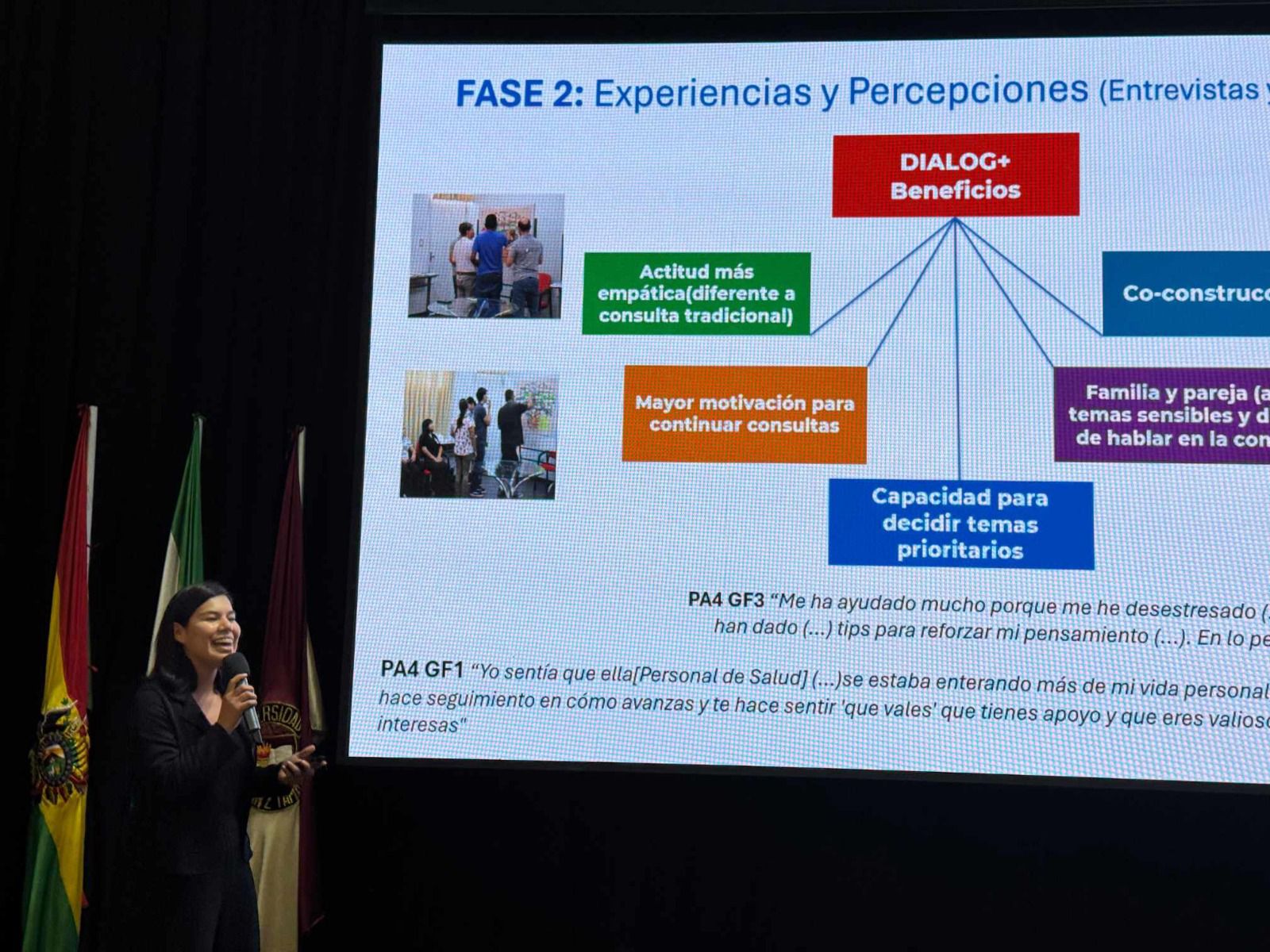Xiomara Meyuy Herrera works as a research assistant at the NIHR LatAm Bolivia Center in Santa Cruz de la Sierra, in collaboration with the Universidad Privada Franz Tamayo (Unifranz), while pursuing a Master’s in Clinical Epidemiology in Colombia. Her career reflects a deep commitment to vulnerable communities and the conviction that data, when interpreted with rigor and sensitivity, are much more than numbers.
What postgraduate program are you studying and what inspired you to pursue this area?
I am studying the Master’s in Clinical Epidemiology at Pontificia Universidad Javeriana in Colombia. My motivation to follow this path came from key experiences: the valuable support and guidance from my research mentors, my fieldwork as a research assistant in vulnerable communities and health centers. These experiences allowed me to identify the gaps in access to health care faced by patients with chronic non-communicable diseases and mental health conditions, due to the lack of local scientific evidence.
Through this journey I realized that well-interpreted data not only have the potential to save lives, but are also fundamental for decision-making and the effective transformation of public policies. Epidemiology stopped being, for me, simply about numbers, and became the stories of people who need evidence-based change. This understanding drove me to apply for the scholarship and specialize in this field in order to translate data into concrete actions that reduce existing inequalities, especially in the area of mental health—one of the most overlooked realities in our health system.
What has been the biggest challenge in your training so far?
One of the greatest challenges has been my transition from research assistant in Bolivia to master’s student in Colombia. This change required not only adapting to a new academic and cultural system, but also learning to balance the demands of graduate school with taking care of my own mental health.
This experience left me with three key lessons that positively shaped me: first, self-care as a professional skill—I learned to prioritize both my academic tasks and my well-being, setting healthy boundaries, seeking psychological support when necessary, and incorporating active breaks into my routine. Second, understanding the importance of support networks—I built from scratch an interdisciplinary community of peers, mentors, and friends that became both my emotional and academic support. And finally, by seeing research through a human lens, I understood that studying mental health requires first taking care of your own, and that the best scientific findings emerge when the researcher works from a place of balance. Today, I apply these lessons in my daily work.

What key skill have you acquired during this time?
As a research assistant and master’s student in Clinical Epidemiology, I have developed a clear and deep understanding of the fundamentals of this discipline, including the main epidemiological measures, different research designs, and the application of population thinking to complex public health problems. This comprehensive training has strengthened my ability to formulate clear and relevant research questions, conduct systematic literature searches, and critically appraise scientific literature—identifying possible biases, assessing internal and external validity, and recognizing methodological limitations that affect the applicability of results.
In addition, I have gained practical experience in data collection and management, and developed essential skills in clinical biostatistics for the accurate interpretation of research findings, including the use of statistical software for both descriptive and analytical analyses. At the same time, I have learned to perform qualitative data analysis and interpretation. Over this period, I have also cultivated communication skills that foster effective collaboration in multidisciplinary teams, and I have learned to strategically manage time to meet objectives efficiently.
What is the topic of your thesis or final research project?
Invisible Realities: Prevalence and Associated Factors of Anxiety, Depression, and Alcohol Use Disorder under the DIADA Care Model in Primary Health Care Centers of Santa Cruz de la Sierra, Bolivia.

Where do you see yourself in five years with your research?
In five years, God willing, I see myself leading public health research projects focused on mental health in Latin America, with a special emphasis on the integration of mental health services into primary care. I aspire to contribute to the development of public policies based on scientific evidence that reduce the gaps in access to diagnosis and treatment for prevalent and disabling conditions such as depression, anxiety, and risky alcohol use.
I also hope to consolidate a network of interdisciplinary collaboration among researchers, health professionals, and decision-makers, to generate contextualized and culturally sensitive evidence. My goal is for the data from my research not to remain only in publications, but to serve as a reference point for the development of effective interventions that improve the quality of life of the most vulnerable people. And of course, to keep learning always… because in research, well-directed curiosity also saves lives.

